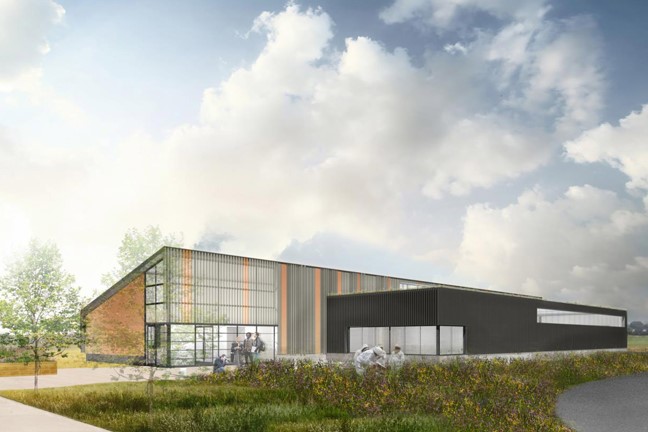
The 10,000-square foot laboratory consolidates lab space, honey extraction, observation hive space, offices and equipment space. Photo credit: Alliiance
Bee and pollinator researchers at the University of Minnesota are ready to take their research to the next level in a new, state-of-the-art Bee and Pollinator Research Lab. After a multi-year fundraising campaign and building construction, the University takes another step toward discovering solutions every day to protect bees, which in turn will help to protect our food supply and human health.
The new Bee and Pollinator Research Lab, a part of the College of Food, Agricultural and Natural Resource Sciences (CFANS), will centralize and facilitate the important bee research projects currently underway. The facility expands and enhances the Bee Lab group’s internationally recognized research and teaching program and provides opportunities for enhanced interdisciplinary and international collaborations.
The 10,000-square foot laboratory consolidates lab space, honey extraction, observation hive space, offices and equipment space. The cost of the facility reached about $6 million, with state-funded bonds covering two-thirds of the cost of the project and the balance funded through private gifts.
The goal of bee research at the University of Minnesota is to promote the health of bee pollinators, and because of the new facility the research team can better accomplish that overarching goal and additionally provide the richest learning environment for students at all levels and from all backgrounds.
The Bee Lab research team is driven by the research of Dr. Marla Spivak, MacArthur Fellow and Distinguished McKnight Professor in Entomology, who conducts research on honey bees with support from Gary Reuter and graduate students; and Dr. Dan Cariveau who conducts research on the ecology and habitat needs of native bees.
Solving colony collapse while ensuring the world’s food supply from plants that rely on bees for pollination—from soy beans and almonds—requires a wide range of experts working together and from diverse perspectives and subject matter expertise. CFANS is leading the interdisciplinary effort to address these grand challenges—from pollinator research to plant genetics, and innovative ways to maintain and grow crop yields while protecting bees— to help solve hunger in the world.
In celebration of this accomplishment, the public is invited to attend a ribbon cutting ceremony and grand opening event to learn more about this new facility and the research efforts underway on October 29 beginning at 2 p.m. The event is an opportunity for the public to meet the facility, talk with researchers, and learn more about the importance of pollinators to our world food safety.






